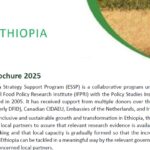This study aims to assess the current state, successes, and challenges of Integrated Agro-Industrial Parks (IAIPs) in Ethiopia, with a specific focus on the Yirgalem Integrated Agro-Industrial Park (YIAIP). The analysis is based on an extensive literature review and semi-structured interviews with key informants (KIIs). By examining the current state of Ethiopia's IAIPs, the research […]
ESSP BROCHURE 2025
The new IFPRI-ESSP 2025 Brochure summarizes: • The Program Objectives • Strategic Policy Research Areas • Collaboration and Partnerships • Capacity Strengthening and Outreach ESSP Brochure 2024. Brochure 2025 v1
The Food Security Simulator Ethiopia (FSSE): An innovative household food security assessment tool
First presentation of the Food Security Simulator Ethiopia (FSSE) at the Hybrid Research & Policy Conference for Livestock, Gender, and Agency Amid Conflict in Ethiopia, December 11th, 2024. Read more>>
Cointegration analysis of sesame prices in Ethiopian commodity exchange warehouses
This study examines the cointegration of sesame market prices in eight Ethiopian Commodity Exchange (ECX) warehouses and its implications for improving the functioning of sesame markets. We analyzed 489 weekly market price data points for each of the eight ECX warehouses, covering the period from end of 2014 to mid-2024. We estimate the Multivariate Vector […]
Rural institutions and the technical efficiency of teff production in Ethiopia
We examine the effect of rural institutions on plot-level technical efficiency of teff production. We account for differences in production technology, access to the market, plot characteristics, and weather shocks across plots and investigate the robustness of the effects of rural institutions on technical efficiency across various specifications. Using a large and detailed cross-section of […]
- « Previous Page
- 1
- …
- 9
- 10
- 11
- 12
- 13
- …
- 123
- Next Page »




